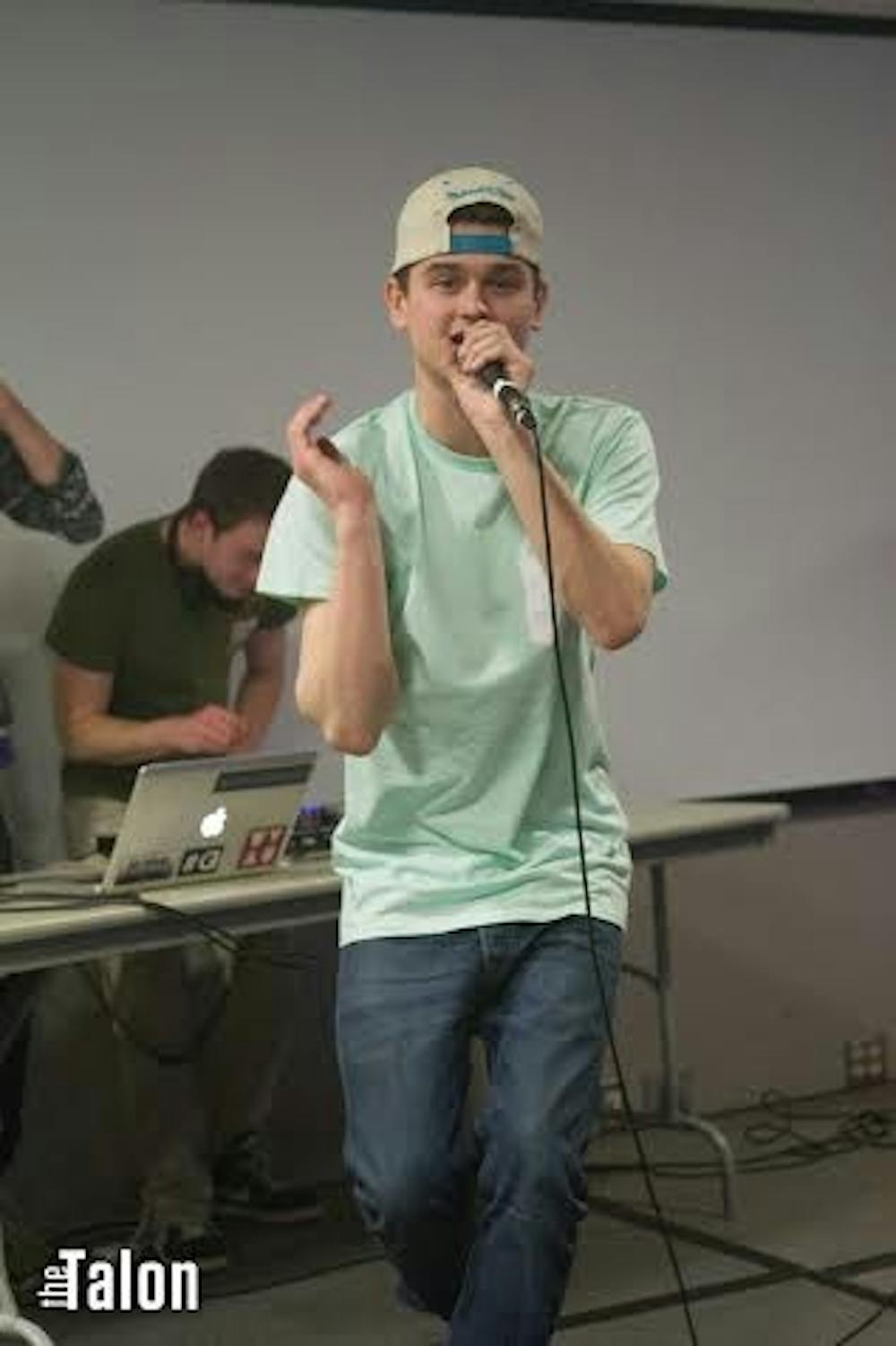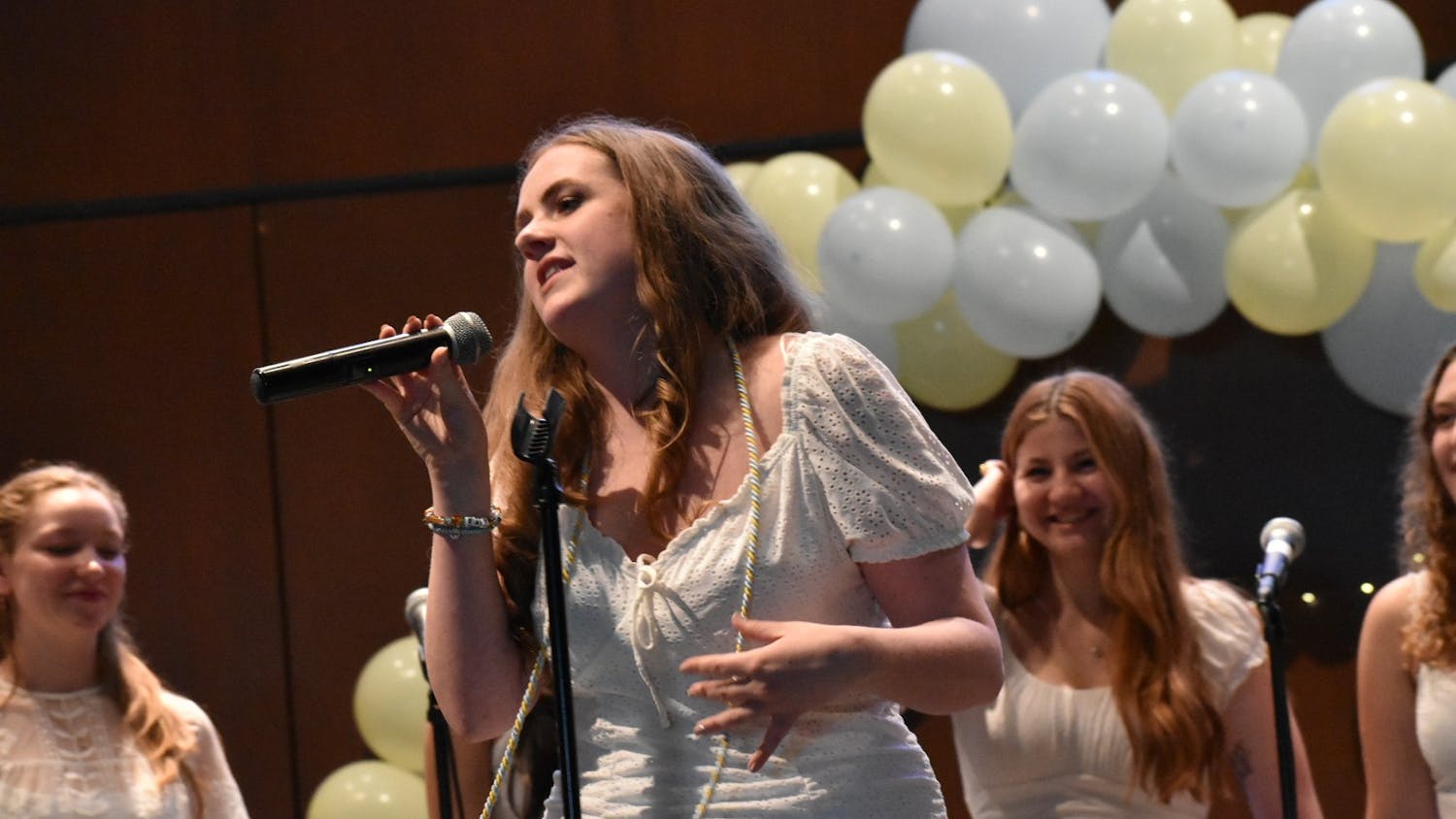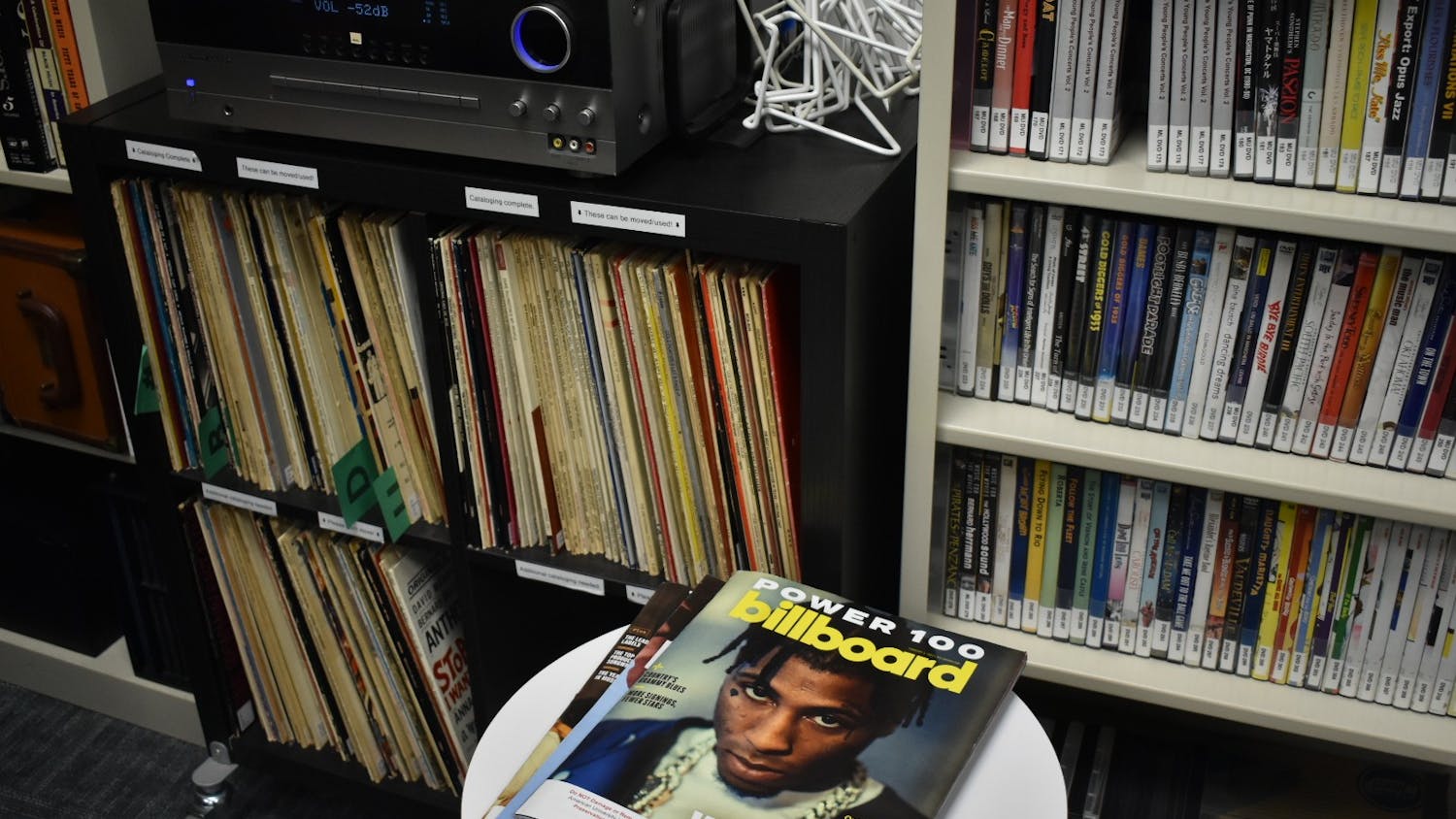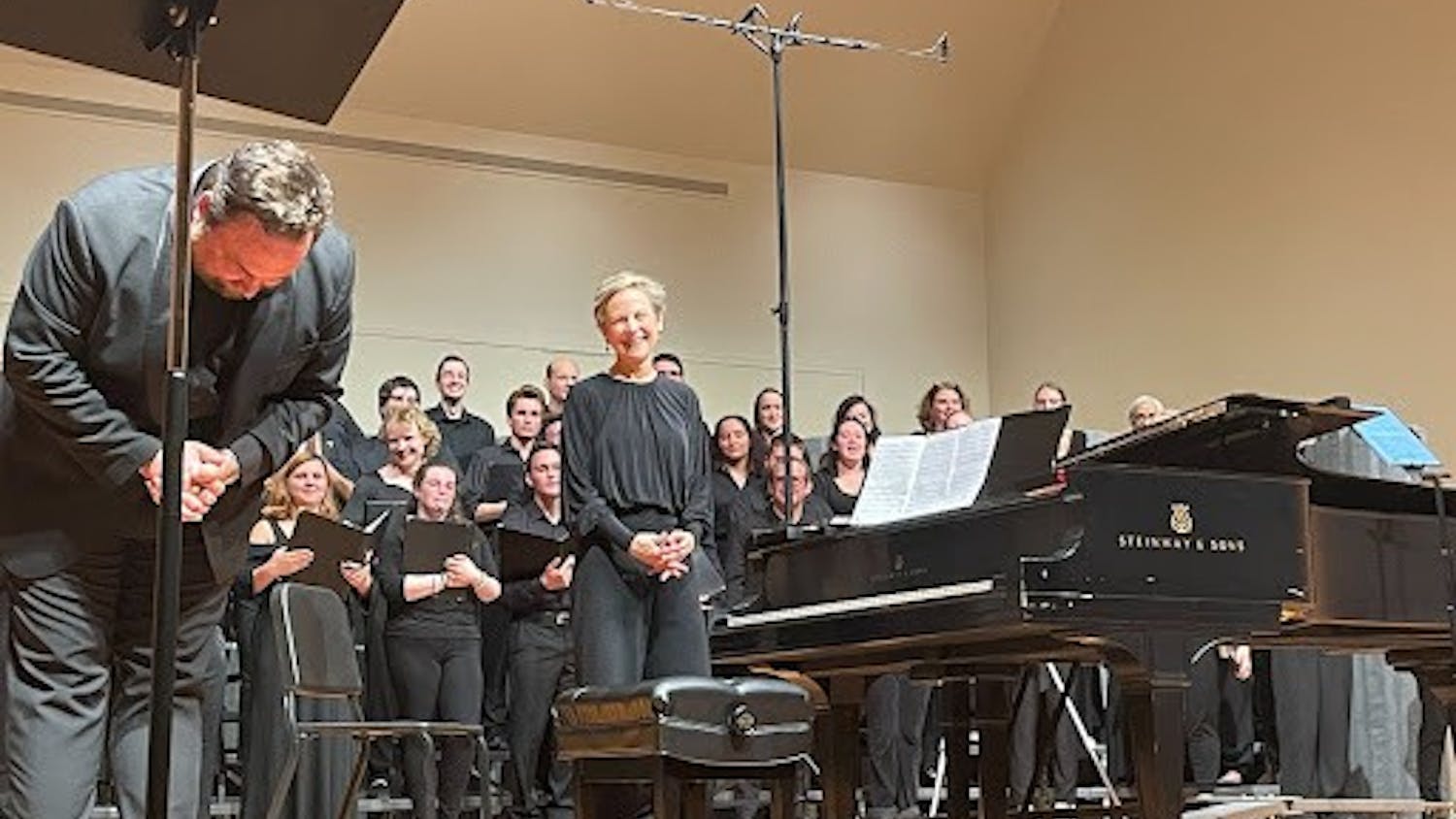The Eagle sat down with Cameron Kaminski, AKA Lyrx, who has recently gained attention for his opening slot for Chance the Rapper’s show on April 10, presented by SUB and WVAU. Lyrx also released his mixtape “Pretty Cameras” on April 1.
Eagle: What can readers expect from your new mix tape “Pretty Cameras”?
L: “Pretty Cameras” is pretty much going to be my debut. I released a mixtape about a year and a half ago that I’m not very proud of and it’s off the Internet – it doesn’t really exist anymore. “Pretty Cameras” is the first thing I’ve ever completed that I’m ecstatic about. There are 16 tracks on it and from the beginning to the end is just my heart and soul. Everything that I’ve gone through to put it together is in that mixtape: my experiences, my path to get where I’m at. I’m just really excited about it. You’re going to expect it to really make waves. If people don’t notice this, I’m not sure what I did wrong.
E: You released “Classy,” a single off of “Pretty Cameras,” this December. What has the response been like so far?
L: People love “Classy.” I’ve had a couple radio stations hit me up asking about it at this point and a couple of different record companies. I’m in talks with Atlantic Records right now and Warner Brothers has sent me an email, and so we’re just trying to take it a day at a time and see what happens after.
E: When did you start working on “Pretty Cameras” and how did it come to be?
L: “Pretty Cameras,” I knew that’s what the mixtape was going to be called about a year ago. To build this has been about a year or a year and a half process. When most people start in the music industry, a lot of people are like, ‘I want the fame, I want the money, I want the recognition.’ I could care less about getting paid and people knowing who I am. I’d rather them listen to my music. So the title “Pretty Cameras” is meant to be that people look for the pretty cameras, but I’m trying to hide behind it. You’re not going to see my face on the mixtape cover, you’re not going to see me out there because I’d rather people listen to my music and judge based of that than ‘Oh, here’s another white kid trying to make it in the hip-hop game.’
E: You write your own music. What is your writing style and process like?
L: I don’t write every day. More times than not I’ll be sitting with homies and then just get up and leave and then just go to my room and start writing because something will hit me and I feel like I need to do it. It’s very much chill, laid back. I want people to listen to it and have this mentality of ‘Yeah, I’ve thought of this exact same thing before.’ You may have not gone through it, but at one point in your life this has occurred to you. That’s what I want people to take, that something that they’ve heard on this mixtape will be something they can relate to personally. My writing style derives from West Coast hip-hop – that’s where I come from, I’m from Seattle – so people like Macklemore. Macklemore was one of my big influences growing up, but I’m not really a fan of him right now. He’s very much gone mainstream, and I’m not looking for mainstream stuff. I’d rather take it away from mainstream and try and bring underground and independent back up into it.
E: You’re from the West Coast, traveled to Europe where you performed as a Christian rapper and now you’re here at AU. How has your musical career evolved and where are you now working to take it to next?
L: I didn’t start writing music until I went to Europe. I spent six months in Europe on a Christian missions trip and the third month in I had a 60-year-old Egyptian Christian prophet tell me I had a gift for rapping. And I was kind of like, ‘Uh, okay, you’re clearly psycho, you don’t know what you’re talking about. I’ve never freestyled, never wrote, done nothing.’ So he pushed me for three days to write a song and I did. And originally what I started as was a Christian rapper because I was on a missions trip and that was the lifestyle I was in. I’m not a Christian rapper anymore, and I don’t want to be associated with that at all. I’m a very spiritual person, but I would not consider myself a Christian. I do believe that there’s a god, but I’m not going to preach it. My view is my view and you get to decide your own, and I just want you to be the type of person who is a good person – I don’t care where that comes from. And so I felt like staying as a Christian rapper limited myself and limited the audience that I could reach out to and share my message with. So I’m 100 percent steering away from Christian rap, anything of that sort, and its just kind of real life rap. I can’t rap about like,‘drugs, hoes and money,’ like I’m just not that kind of person. I’d rather do hip-hop about real life stuff and keep it to my experiences.
E: How did you get into hip-hop and why does that genre speak to you?
L: I actually grew up listening to oldies from my dad and country music from my mom. I was never allowed to listen to hip-hop music growing up because my parents were in the church and they thought it wasn’t morally right. In 2010, I met this kid who is now basically my brother. His name is Isaiah Connor. I actually met him at a Christian camp and said I want you to move to Washington and live with my family. So three months after I met him he switched coasts and moved in with my family in Seattle. He is this big 6’5,” 200 lb. black kid from the inner city of Boston. And so our lifestyles were completely different and he started to introduce me to old school hip-hop and hood hip-hop and stuff like that. I started to listen deeper and realized that there’s a lot of subliminal messages in hip-hop that you don’t really hear in the type of music I had been listening to growing up. To me it’s the most creative. It’s the most lyrically diverse, and it basically just takes from everything. I feel like hip-hop can pull from every other genre and make it into something of its own whereas the other genres are kind of limited to certain things. In hip-hop you can take things from country, you can take things from oldies or super classical jazz and sample it into awesome hip-hop beats and then put your message over the top of it, and that’s what I love about hip-hop.
E: Hip-hop has changed a lot over the years. How do you see yourself playing a role in its evolution?
L: I see myself trying to open up an avenue where more people can listen to hip-hop without having a negative connotation to it. A lot of people who don’t listen to hip-hop don’t listen to hip-hop because they don’t like the message. But I hang around a lot of people who like hip-hop and don’t really care about the message, they just like the beat and get hype. I see myself creating an avenue that allows more people to listen to hip-hop and not feel constricted by ‘I’m not in this age group, I’m not this race, I shouldn’t be listening to it.’ I want it to be able to expand over generations and expand over race so that people just listen to music and enjoy it for what it is. So I guess that would be where it’s headed – I don’t care about mainstream, I don’t care about making a s—-load of money, I just love making music.
E: How do you deal with the skepticism about someone being a white rapper?
L: My homies just kind of like [mess] with me about it. It took me a while to get okay with it, and now I’ve just embraced it. I mean it’s going to be difficult for people to take me seriously as it is, so if I can’t take myself as a joke from time to time then other people aren’t going to be able to be like, ‘Alright, so this kid is just doing his thing and he doesn’t really care what other people think.’ Everybody looks at me as a white rapper and that’s the first thing they see. So when people will hear that you do hip-hop or I’ll tell somebody like, ‘Yo, I rap,’ and their first response will be to look at me funny, like, ‘Wait you rap?’ And I’m just like, ‘Yeah’ and I have no problem just being like, ‘Do you want me to spit something?’ and then they’re like, ‘Sure’ and I’ll do and it. And then they’re like, ‘Okay, so I get it now.’ So it’s kind of cool because it catches people off-guard and I guess that’s the benefit to it. People aren’t going to see me as the kid who’s next up, but I’m going to be able to surprise people and come out of nowhere and so I’m just really excited about that.
E: Where did the name ‘Lyrx’ come from?
L: Back to when I was a Christian rapper – I started and I was originally called ‘Lyrically Acceptable,’ but realized I don’t want to be called that it’s way too long. But I still wanted my lyrics to be different. So I shortened it and spelled it l-y-r-x to symbolize that even though I may be writing lyrics, they’re still different. I still get my own swing on them, I still get to create what I want to create and so that’s the play on words there.
E: You’re opening for Chance the Rapper on April 10. What are you most excited for?
L: Chance is my favorite artist in the game. I mean, he is the only sticker I have on my laptop. Chance is doing something that is unprecedented in hip-hop where he’s doing whatever he wants to do and people are responding to it because he’s a genuine person. He doesn’t talk about things that he doesn’t deal with. In terms of his acid rap mixtape, he did the whole mix tape on acid and in a month he wrote, he recorded, everything. And people are ignoring the fact that he did it on drugs and are listening to it and are enjoying it because it’s a great piece of music. And like he takes from a bunch of like old school ’60s and ’70s influences, coming out of Chicago. He is huge right now and his acid rap mixtape was the definition of my summer. I listened to it every day, our group of friends played it all the time, it was always on. And so to be able to say that the biggest influence that I have currently, I get to perform with him is just mind-blowing. I remember when I found out it was official and I was going to be able to do it. I was jumping up and down and screaming, ‘I got it, I got it!’ So I’m just stoked to be able to say that I was the opener for Chance the Rapper at my school for all the people that I’m friends with. I don’t know if I’m ever going to be able to say that again, to have all of my friends in the same spot who are all excited to see me and excited to see somebody else. I’m just stoked.





